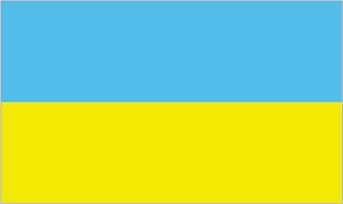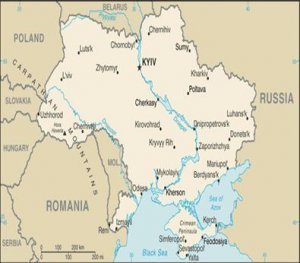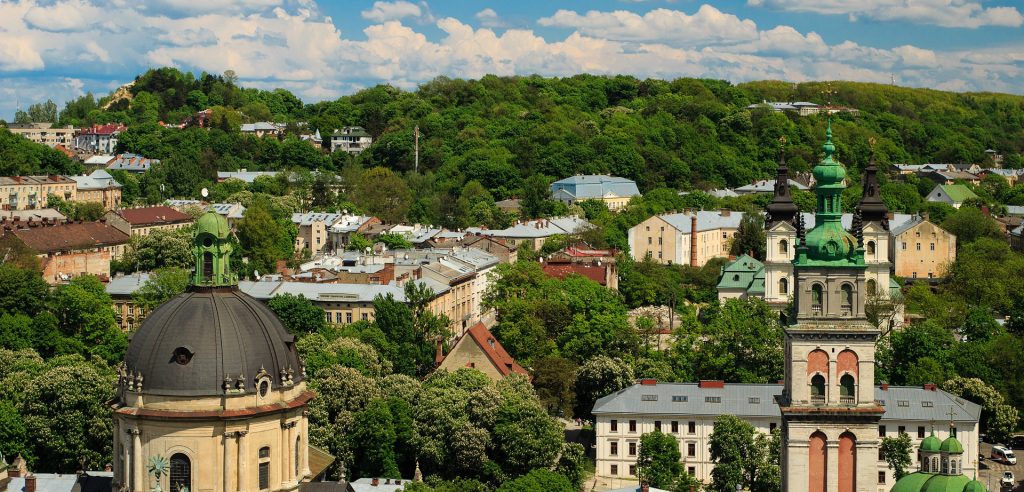
GEOGRAPHY
Ukraine covers an area of 233,088 square miles and is the second largest country in Europe. The majority of the landscape is flat with the exception of the north dominated by forests. The country’s natural boundaries are the Carpathian Mountains in the southwest, the Black Sea to the south and the Azov Sea to the southeast. Its national neighbors are Belarus to the north, Poland to the northwest, Slovakia and Hungary to the west, Romania and Moldova to the southwest, and Russia to the east.
HISTORY

The first eastern Slavic state, Kyivan Rus, formed during the 10th and 11th centuries and was the largest and most powerful state in Europe at the time. After battles with invading Mongols, Kyivan Rus was incorporated into the Grand Duchy of Lithuania and eventually into the Polish-Lithuanian Commonwealth. In the following centuries, Ukrainians continued a cultural and religious nationalism which lead to an up-rise against the Poles and established a new Ukrainian state, the Cossack Hetmanate, by the mid-17th century. This new state lasted for another 100 years until the latter part of the 18th century when most of the Ukrainian territory was absorbed by the Russian Empire. In 1917, after the fall of czarist Russia, Ukraine enjoyed a short independence until 1920 when it was conquered again by the Soviets. During this period of brutal rule, between 1921-1933, the Soviets forced two famines on the Ukrainians leaving over 8 million dead. German and Soviet armies were responsible for 7 – 8 million more deaths during World War II. The territory of Ukraine also expanded during World War II and eventually Crimea became part of the territory in 1954. However, the territory of Ukraine remained under Russian control. Ukraine achieved its independence in 1991 following the dissolution of the Soviet Union, but democracy in the country has remained unstable with corruption and state control continuing to be an issue. Because of Crimea’s majority Russian population and strategic location along the Black Sea, the area became an ongoing dispute between Russia and the Ukraine, and by 2014, Crimea was annexed by Russia.
THE PEOPLE
Ethnic Ukrainians make up 78% of the population while ethnic Russians make up 17%. The Ukrainian Orthodox Church and the Ukrainian Greek Catholic Church are the dominant religions of the region. Only about 16% of Ukrainians claim to be non-religious or have no affiliation with any formal religion. About 70% of the population has a secondary or higher education.
SOCIAL CONVENTIONS
Ukrainians are generally friendly to visitors, and it’s not uncommon for them to invite strangers into their homes. Shoes are normally removed before entering someone’s home. If you are a guest to someone’s dinner, it may be considered rude not to accept any food that is offered. Men shake each other’s hands when they first meet, but men should not shake a woman’s hand unless it is offered. When entering a church or mosque, women should keep their heads covered.
LANGUAGES
Ukrainian and Russian are the most widely used languages in the country. Although about 85% of the ethnic Ukrainians identify Ukrainian as their native language, it is mostly spoken in western and central Ukraine. Russian is the dominating language in areas including Kiev, Crimea and eastern Ukraine.
GOVERNMENT
Semi-presidential republic
TIME ZONE
UTC + 2 – (observes summer daylight savings time)
ELECTRICITY
230V supply voltage and 50Hz
Plugs and Sockets Type C & F
CLIMATE
Ukraine has a temperate continental climate with a Mediterranean climate only on the southern Crimean coast. Summers are between June and September and can be very hot in the southern region while reasonably warm in the greater part of the country. Winters vary from cool along the Black Sea to very cold with snow farther inland. The northeast is known for the coldest winters, while the Crimean region has the warmest temperatures.
Clothes to Wear:
Heavy clothing is required for the winter, while light weight clothing is needed for the summer. Medium weight clothing works best during spring and autumn.
LOGISTICAL
Entry & Exit Requirements:
- You do not need a visa to enter Ukraine for tourism purposes for visits of up to 90 days in any 180 day period, but must be able to provide proof of valid health insurance and sufficient funds for the duration of your stay.
- No vaccinations are required for entry, but you should be up-to-date on all recommended vaccinations.
- A visa and residency permit is required for stays over 90 days. You must receive the visa in advance at a Ukrainian embassy or consulate. You cannot get a Ukrainian visa at the airport or at the border. For information regarding visa requirements, visit the Ukrainian Ministry of Foreign Affairs at https://mfa.gov.ua/en.
- You must have a visa to apply for a Ukrainian residency permit; you may not do so while on visa-free tourist travel. You must apply with the State Migration Service of Ukraine (SMS) for a residency permit no later than 15 working days before your visa’s expiration date. Once you have a residency permit you can reside in Ukraine for as long as it remains valid.
Crimea: There is an extensive Russian Federation military presence in the Crimean Peninsula. If you choose to travel there, you should be aware:
- U.S. government employees are prohibited from traveling to Crimea and the U.S. is unable to provide emergency services to U.S. citizens there.
- You may only legally enter Crimea from mainland Ukraine.
- Entrance into Crimea by any other entry point other than from mainland Ukraine, such as air, sea, or the Kerch Strait Bridge is illegal. You will be denied entry into mainland Ukraine and banned from entering Ukraine for five years.
- Time spent in Crimea will count against the 90 day visa-free period.
Eastern Ukraine: Russian-led forces continue to control areas of the Donetsk and Luhansk oblasts, and the ongoing armed conflict has resulted in more than 10,000 deaths. It is advised not to travel to and in this region. If you choose to travel to these areas, you should be aware:
- U.S. government employees are prohibited from traveling to the eastern parts of the Donetsk and Luhansk oblasts and to adjacent regions, and the U.S. government has limited ability to provide emergency services to U.S. citizens there.
- Entering Ukraine through the area of armed conflict is a violation of Ukrainian law. U.S. citizens who enter Ukraine illegally through the area of armed conflict along the Russian border will not be allowed to pass through government checkpoints to territory controlled by the government of Ukraine.
- Ukraine’s Security Service (SBU) procedures at entry/exit points require that permit applications be submitted and approved electronically prior to travel in the zone of armed conflict.
HIV/AIDS Restrictions: The U.S. Department of State is unaware of any HIV/AIDS entry restrictions for visitors to or foreign residents of Ukraine. However, anyone with tuberculosis cannot get permanent residency in Ukraine. There are no waivers or exceptions to this rule.
Embassy Locations:
4 A.I. Sikorsky St. (formerly Tankova)
04112 Kiev, Ukraine
Telephone: +38 (044) 521-5566
Emergency After-Hours Telephone: +38 (044) 521-5000
Fax: +38 (044) 521-5544
Email: kyivacs@state.gov
Canada Embassy Kiev
13A Kostelna Street
Kiev 01901
Tel: 380 (44) 590-3100
Fax: 380 (44) 590-3134
Email: kyiv@international.gc.ca
Health:
By Ukrainian law, all foreigners coming to Ukraine must have medical insurance covering their period of travel. Note that the general quality of healthcare in Ukraine does not meet U.S. standards.
- Fees at government clinics and hospitals are lower than those at private clinics, but there have been reports that doctors request bribes or additional payments before treating patients.
- Private physicians and private hospitals charge fees for services, and some do not accept local health insurance.
- Public facilities only accept cash payments, while most private clinics accept credit cards.
Medical Insurance: Make sure your health insurance plan provides coverage overseas.
We do not pay medical bills. Be aware that U.S. Medicare does not apply overseas. We strongly recommend supplemental insurance to cover medical evacuation.
Medication: If traveling with prescription medication, check to ensure the medication is legal to bring into the country, as many medications that are legal in the United States are prohibited in Ukraine. Always carry your prescription medication in original packaging with your doctor’s prescription.
The following diseases are prevalent in Ukraine:
- Influenza
- Tuberculosis
Vaccinations: Be up-to-date on all vaccinations recommended by the U.S. Centers for Disease Control and Prevention.
Information on vaccinations and other health precautions, such as safe food and water precautions and insect bite protection, may be obtained from the Centers for Disease Control and Prevention’s (CDC) hotline for international travelers at 1-800-CDC-INFO (1-800-232-4636) or via the CDC website at http://wwwnc.cdc.gov/travel. For information about outbreaks of infectious diseases abroad, consult the infectious diseases section of the World Health Organization (WHO) website at http://www.who.int/topics/infectious_ diseases/en/.The WHO website also contains additional health information for travelers, including detailed country-specific health information.
BANKS & CURRENCY
Banks are open Mon-Fri 9:30am – 5:30pm
Currency is Hryvnia (UAH)
COMMUNICATION
Country code: 380
Internet country code: .ua
Internet cafés are available in all cities and towns. Some hotels also offer WiFi.
Cell Phone Usage:
Please contact your cell phone provider to determine whether your contract includes coverage in the country you are visiting. Depending on your contract you may have to add international services and/or country specific services.
ENTERTAINMENT
Food & Drink:
Dumplings, potatoes and sour cream are a staple to much of the cuisine, and food in the Ukraine can be very filling. Pizza places are prevalent and can be found everywhere. International restaurants specializing in Asian, French, Italian, Turkish and Indian can be found in larger towns such as Kiev.
Ukrainian Specialties:
- Deruny – potatoe pancakes.
- Varenniki – dumplings made with potatoes, cheese, meat or fruit.
- Borshch – beetroot soup made with meat broth.
- Pelmeny – ravioli filled with meat.
Nightlife:
Larger towns like Kiev have nightclubs and discos. Some of them operate from barges on the Dnieper River. There are opera performances at theatres in Kiev, Lviv and Odessa. A variety of live musical performances is also available and played around the larger towns at some of the more upbeat restaurants. Most cities have musical comedy, puppet-theater and troupes performing in local theatres, and tickets can be purchased the same day.
Shopping:
Popular souvenirs including jewelry, ceramics, and paintings can be found in galleries or from vendors on the street. Other authentic Ukrainian souvenirs include pyansky (hand painted eggs), hand-embroidered clothes, carved wooden items and matryoshka dolls. It should be noted that it is illegal to take antique items out of the country. Use caution or avoid fur products as they may be from endangered species.
Large department stores are available and are usually opened between 8:00am to 7:00pm Mon-Fri. Smaller stores may close an hour earlier.
BAGGAGE
Baggage rules for international and domestic air travel have changed much in recent years, differ from carrier to carrier and these days even may cover your on-board bags. Checking luggage may cost a separate fee or may be free depending on your personal status with the carrier. We therefore encourage you to read your ticket’s small print and/or contact your carrier for exact rules.
TIPPING
Most restaurants and bars already include a 10% service charge in the bill. It is customary to leave a bit extra for good service. When the service charge is not included in the bill, 10-15% is the general rule. Tips are not expected by taxi drivers, although most people tell the driver to keep the change. Airport and hotel porters should receive the equivalent of US$ 1.00 per bag.
LAUNDRY
Most hotels will arrange affordable laundry services for guests.
PHOTOS & VIDEOS
In some countries you must refrain from photographing sites such as Military bases and industrial installations. Also be aware of cultural sensitivities when taking pictures of or near churches and other religious sites. It is always courteous to ask for permission before taking photographs of people.
USE OF DRONES
The use of drones is being legislated by many countries. In some cases, drones are already forbidden, and their unauthorized use may carry severe penalties. If you plan to travel with a drone, please contact the embassy or consulate of the country you wish to visit.
![SITA Canada Final_color [Converted]new_for_wp SITA Canada Final_color [Converted]new_for_wp](https://sitatourscanada.com/wp-content/uploads/2019/12/SITA-Canada-Final_color-Convertednew_for_wp.png)
